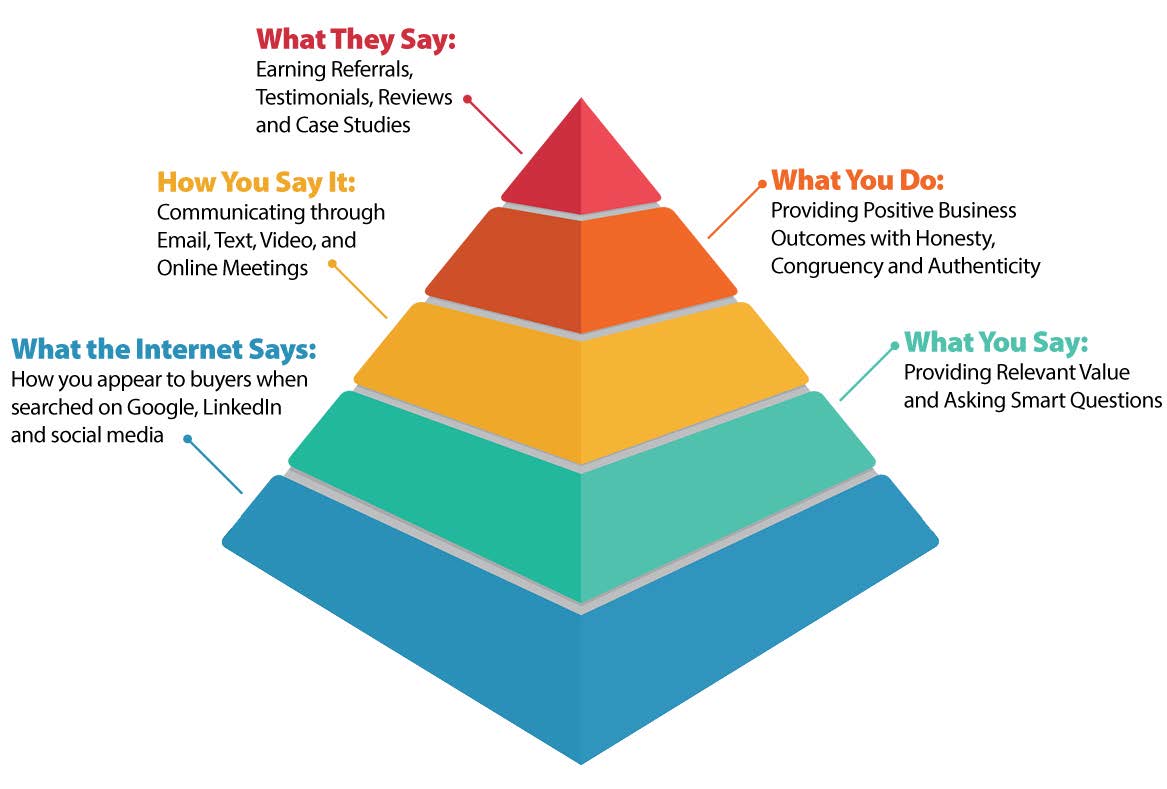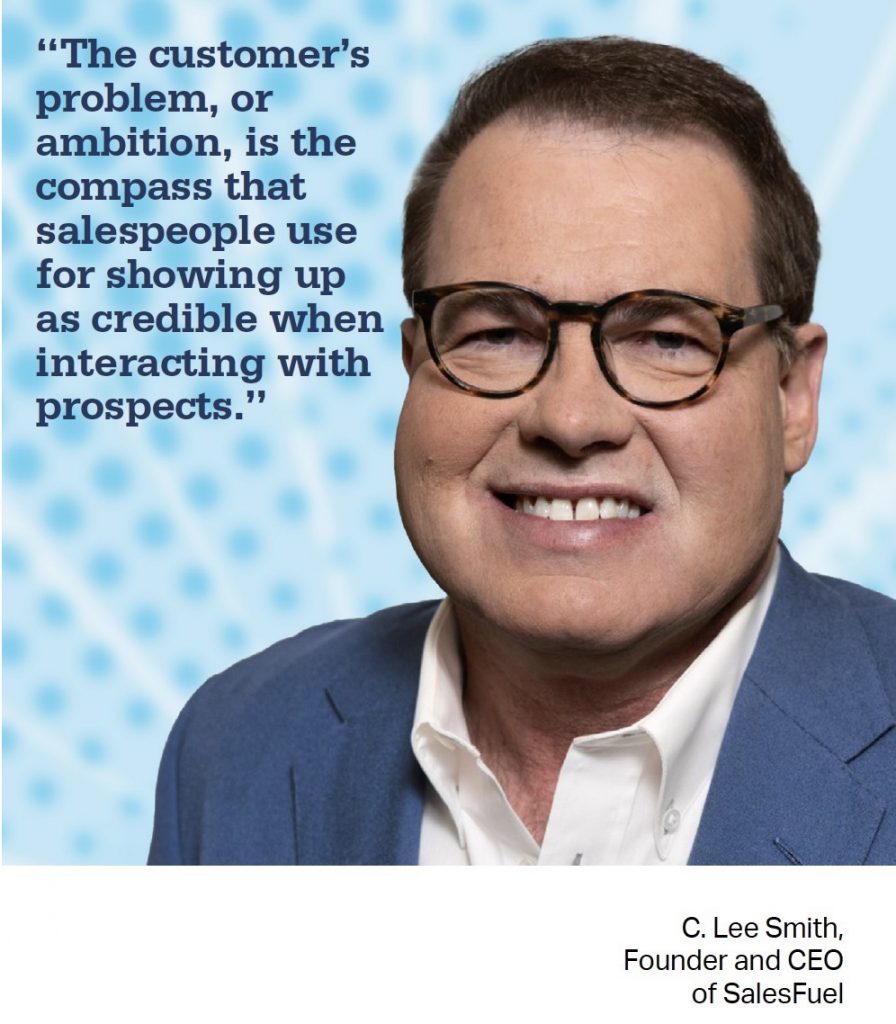A report from CSO states that 77% of buyers don’t see salespeople as a helpful resource to solve their business problems.
Gartner research shows that when B2B buyers are considering a purchase, they spend less than 20% of their time meeting with potential suppliers.
Harvard Business Review reports that a survey of nearly 1,000 B2B buyers revealed that 43% of respondents agreed they would prefer a rep-free buying experience.
How did it come to this? When, exactly, and how did professional salespeople become persona non grata?
The timing of it is fuzzy (and probably not all that important). The cause is more evident, says C. Lee Smith, CEO of SalesFuel, a sales intelligence and enablement firm. In a word, it’s credibility – or more accurately, lack of credibility.
“In B2B sales, salespeople have a driving need to be seen as trusted advisors. You can’t earn trust unless you are first perceived as having a high degree of credibility,” Smith said in an interview with Sales & Marketing Management.
Who’s Qualifying Whom?
Sales professionals have long talked about qualifying the buyer. Sellers don’t want to waste time on a prospect who doesn’t have purchase decision power, lacks the proper budget, or who doesn’t fit an ideal customer persona.
Smith says this is backward. Sellers would be better off being mindful of how buyers are qualifying – or disqualifying – them. How a buyer perceives the seller has significantly more impact on whether a sale is made than how the seller perceives the buyer. Qualified buyers are more likely to meet with sellers who have a reputation for solving customers’ problems and improv- ing their business results.
Such a reputation is how sales credibility – “SalesCred” as Smith refers to it – is built. That seems intuitive, yet Smith says a majority of salespeople don’t get a chance to establish credibility because they insist on talking about themselves, their company, and their products or services. It’s also because our industry’s worst practitioners have caused only a quarter of Americans to view salespeople as credible. So we pay for past sins of others and start most of our new relationships from a position of weak- ness and subservience.
The Hierarchy of Sales Credibility
To help sales professionals develop the sort of credibility that opens prospects’ doors, Smith developed what he calls the Hierarchy of Sales Credibility. It’s a pyramid whose foundation is the information that exists online about the individual seller, and progresses to what you say, how you say it and what you do. The top of the pyramid is what others say about you – referrals, testimonials and reviews.

“To get to the decision-makers that you need to get to, they need to know that you’re not going to waste their time. What you say must be relevant to people,” Smith says. “Providing value requires knowing what the prospect feels is most important.”
Credible salespeople have high levels of business acumen, humanity and empathy for others. For all the talk about artificial intelligence (AI) and other technology replacing salespeople, a fundamental truth is that humans’ empathy along with the ability to connect and build trust are essential to selling and cannot be replaced by technology.
Let’s look more closely at the five levels of establishing credibility and the steps you can take to enhance your standing at each level.
What the Internet Says About You
Keep in mind, while you are researching your prospects, they are researching you. What people can discover about you online is the first level of establishing credibility. Smith says it’s a level that is often overlooked by sales professionals.
“You’ve heard that you don’t have a second chance to make a first impression. These days, you don’t even get to make your first impression; Google and LinkedIn do,” says Smith.
Nearly six in 10 decision-makers polled by SalesFuel (59%) at small-to-midsize companies say they research the salesperson’s LinkedIn profile, job history and social media posts and do a Google search on them before they will meet with the salesperson. The larger the customer, the more likely this is to be true.

Salespeople need to continually monitor their online presence. Sales managers need to help their team members understand the importance of how they come across online. “In one sense, it’s out of your control, but in another, it’s something you can definitely influence and build,” Smith says.
Steps he recommends:
Quality head shots – Make sure the photo that accompanies a LinkedIn profile and other social media is current and professional.
Be connected – How many LinkedIn connections do you have? You’re more credible if hundreds of people find benefit in being connected with you.
“Your profile should speak to your prospects, not your next manager. A lot of LinkedIn profiles are written for a person’s next employer,” Smith says. Use keywords in headlines and your profile that speak to your top prospects. Tell your story about how you can help solve their business challenges.
Get published – If you want to be seen as a credible, reliable source of information, you need to get credible information with your name on it online. This can be a blog post, contributed articles on a third-party site or your own LinkedIn page. Short video tutorials work well also.
Respond to criticism – If you have a negative review or harm was caused by content you created, create a sincere apology, then make several posts that show your enlightened way of thinking.
What You Say
Once your online credibility is established, saying the right things – in emails, telephone conversations, video calls and other means of communication – will get you in the door. Saying the right things requires completing the footwork that’s necessary to understand the prospect’s challenges and addressing topics that are important to them.
The question that kills a salesperson’s credibility the fastest is, “Tell me about your business.” Credible salespeople already know about a prospect’s business and have ideas on how they can help it. In a courtroom, lawyers avoid asking questions they don’t already know the answer to. In sales, it’s the opposite.
Ask yourself if the talking points about your company and your products or services will add relevance to the solutions a prospect is seeking. More often than not, sharing primary or secondary research will go further to establishing credibility than running through product features.
“If what you say is not relevant to the buyer, it’s not relevant,” Smith says. “Relevant value is what’s important to the buyer, the buyer’s boss and their customers.”
The information learned by asking good questions provides the leverage necessary to build great solutions, overcome objections and close a sale.

The customer’s problem, or ambition, is the compass that salespeople use for showing up as credible when interacting with prospects.
How You Say It
How a salesperson communicates can further establish credibility or help destroy it. Showing confidence is paramount, as is matching the level of professionalism of the prospect. Don’t be too casual, use slang or assume a level of friendship that may not exist.
At the same time, being too formal or using too much “marketing speak” will result in a feeling that your messages are one-size-fits-all. Tailor each message to the person who is receiving it. Be human. Here again, show them that you understand their priorities.
Emails should be brief and to the point. Complex conversations should not be held via email. And keep in mind whether you are emailing, calling or meeting in person with a prospect, less can be more.
What You Do
Credibility is only established when words are backed up by actions. Better to lose a sale than to make promises you can’t deliver on, Smith says.
“Outcomes lead to income. The best way to build credibility and get repeat sales is to produce positive outcomes.”
Building credibility through what you do centers around honesty, congruency and authenticity. If the names on a proposed contract were reversed and you were in the buyer’s position, it must still look like a good business deal. If it doesn’t why do you expect the buyer to sign it?
Smith adheres to the philosophy of under promising and over delivering. If you have the opportunity to surprise and delight a client, do it. It’s worth the extra effort and one of the most surefire ways to establish credibility through what you do.
What They Say
What matters most is what your customers say about you, your company and your products or services. Smith quotes author and speaker Jeffrey Gitomer as saying, “When you say things about yourself, it’s bragging; when someone else says it about you, it’s proof.”
“Most salespeople have big egos, too much bravado and do a lot of bragging without a lot of proof. You stand out from the pack by having others do the talking for you in the form of referrals, testimonials, introductions, positive reviews and success stories,” Smith adds.
More than one-quarter of buyers from small and medium-sized businesses say that a testimonial from a satisfied customer can influence their buying decision as long as it’s credible.
Sales managers must work with salespeople to make them “superconnectors.” The proper mindset for getting referrals is to give them. Introducing your customers to other people that can boost their business establishes you as a business partner and increases your credibility.

Credibility Must Be Maintained
Credibility, once earned, isn’t guaranteed to last forever. In fact, it can be lost in a flash.
You’ve no doubt heard the expression “people do business with people they know, like and trust.
Building credibility requires ongoing commitment to being known, being likable, being trustworthy – and just as importantly – being helpful.
Sales managers can help their team members establish credibility by reviewing these steps and helping them adhere to them.
“Some people mistakenly believe that credibility is the same as personal branding. Personal branding is how you want to be seen; credibility is how you actually are seen,” Smith says. “You have a different level of credibility with each account you serve.”
“And your credibility is worth much more than any sale. Never compromise your principles, even if a competitor is doing it,” he adds. “You’ll feel great about the deals you’ve won and you’ll win friends, which leads to even more sales.”

Get our newsletter and digital focus reports

Stay current on learning and development trends, best practices, research, new products and technologies, case studies and much more.


